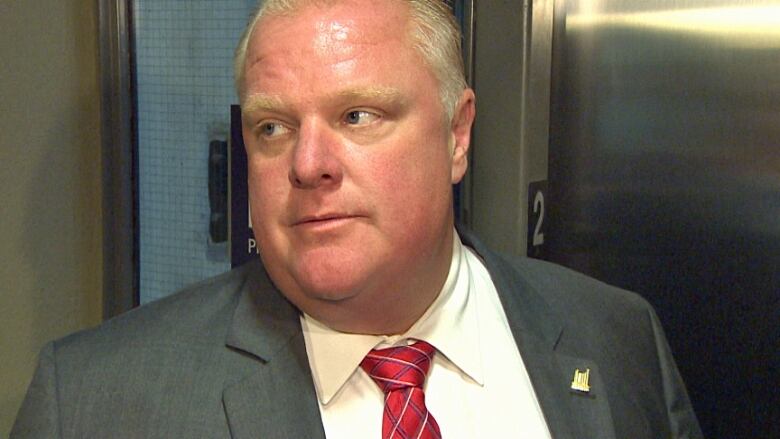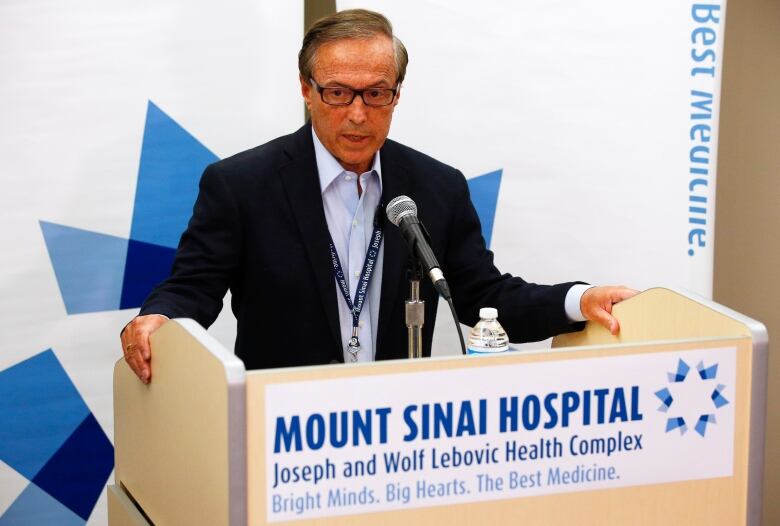Rob Ford diagnosis: What is liposarcoma and how is it treated?
A look at the cancer that forced Rob Ford to drop out of the Toronto mayor's race

What exactly is liposarcoma, the rare but aggressive form of cancer that forced Rob Ford to drop out of the Toronto mayor's race and begin a treatment regime that will include chemotherapy?
- Rob Ford to undergo chemotherapy for treatment ofliposarcoma
- Rob Ford cancer diagnosis prompts well-wishes from Tory, Chow
- Rob Ford's cancer diagnosis: Will the mayoral candidates soften their attacks?
- Go easy on the families of cancer patients, doctor says
Dr. Robert Canter, a surgical oncologist and associate professor of surgery at the UC Davis Cancer Centre in Sacramento, Calif., was interviewed on CBC Radio's Metro Morning on Thursday. While he is not involved in Ford's treatment, Canter spoke generally about what patients facing a similar diagnosis can expect in terms of treatment options.
What is liposarcoma?
It's a cancerous tumour located in the body's fatty, connective tissue. This kind of tissue can be found at various locations in the body including the abdomen, where Ford's tumour is located. Behaviour of the tumours can be varied. Dr. Zane Cohen, the head of Ford's treatment team, described Ford's liposarcoma as "fairly aggressive" but also said he was "optimistic" about his ability to treat it. The type of liposarcoma Ford has is described as "pleomorphic," which means the cells inside the tumour all look different when viewed under a microscope. Liposarcoma is rare Cohen said it comprises only about one per cent of all cancers. Cohen said Ford's tumour is about 12 centimetres by 12 centimetres in size.

Canter, in his interview with CBC's Matt Galloway, said it's not uncommon for tumours of that size to occur in liposarcoma patients.
"They [tumours] can get this size in the abdomen because there's space for them to grow and push other organs out of the way before they become symptomatic," he said.
Ford's family said the mayor had complained of pain for about three months. Canter said pain, along with bloating and nerve compression, can occur when a tumour presses against blood vessels and organs. He said removing the tumour could be difficult if it is pressed against organs.
What causes this cancer to develop?
Canter said it's often impossible to pinpoint what causes these tumours. "Some sarcomas are associated with genetic conditions that are present at birth, some are related to certain exposures, such as history of exposure to prior radiation. Most sarcomas are somewhat random," he said. "In terms of the exact cause of why cancer develops, a lot of it is related to random genetic mutations."
What are the treatment options?
Canter said treatment for large, aggressive sarcomas can be "quite intensive." He said treatment can be complicated if there's evidence a tumour has spread at the time of diagnosis. Ford's doctors said Wednesday that in addition to the tumour in his abdomen, they also found a "small nodule" in his buttock, behind his left hip, which a biopsy showed is part of the same tumour. That second tumour is about two centimetres in size.
"If a tumour can be removed completely, obviously that's associated with the best outcome," said Canter.
Cohen said Ford will undergo chemotherapy at the hospital, likely starting in the next two days, then spend most of the following 18 days at home. After that, the cycle will be repeated a second time.
Canter said this approach is an attempt to stop the tumour from spreading in the hopes than it can later be removed.
"If there's evidence of spread at time of diagnosis, then the situation becomes a little bit more problematic because complete removal of all disease then becomes more challenging and the risk of developing additional spread of the tumour at other sites goes up," he said.
Dr. Nancy Baxter, the chief of general surgery at St. Michael's Hospital, told CBC News Wednesday that the second tumour "is quite concerning."
"When there is evidence of spread, we tend to have less of an opportunity to treat patients for cure," said Canter. "If they have good response, then they become surgical candidates, but that's not a foregone conclusion."
What is the survival rate for this kind of cancer?
Cohen would not discuss the mayor's prognosis at Wednesday's news conference. According to the Liddy Shriver Sarcoma Initiative, the five-year survival rate in pleomorphic liposarcoma patients is 56 per cent, while the 10-year survival rate is 39 per cent.The Canadian Cancer Association says the five-year relative survival rate for all soft tissue sarcoma is 65 per cent.
It's become a partner in my life.-Teresa Bell, diagnosed with liposarcoma11 years ago
Teresa Bell has lived with liposarcomafor 11 years, which she dubs "a cancer marathon."
"It's become a partner in my life," she told CBC News.
When she was initially diagnosed, she didn't know what liposarcoma was, which she says made the news less traumatic.
"If I had been told I had lungcancer, I would have reacted much differently," she explained.
She now travels from Belleville, Ont., a town east of Toronto, to Montreal for chemotherapy and says she hopes Ford's diagnosis will help raise awareness for the rare cancer. She's hosting her annual Step & Fetch fundraiser this weekend just outside of Belleville.
The most important thing Bell has learned throughout her cancer battle is "to do what's important to me."
That's her advice to Mayor Ford. "I really need to think about what matters to me and then live the life that comes in line with that."
With files from CBC's Steven D'Souza












_(720p).jpg)


 OFFICIAL HD MUSIC VIDEO.jpg)
.jpg)



























































































